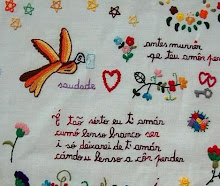
“A friend of mine insists that you have to be Portuguese to understand fado. In one sense she's right—fado is intimately associated with poetry, and you pretty much have to be a native speaker to grasp that part. And the feeling of the music is also intimately associated with saudade. The fact that saudade has no direct translation into English is an important point (close ideas include nostalgia, loneliness, yearning, and missing). My Portuguese friend's eyes immediately glaze over when she hears that word.
But words are just one form of language. Music is another. You don't have to be Andalusian to appreciate flamenco, and you most certainly don't have to be African American to dig the blues. Folk music is the music of the people, passed down the generations by ear. And needless to say, it goes quite well with dance.
But then I'm not Portuguese, so what do I know.
A quick rundown of informative words from the English translation: silence, fire, happiness, grief, kiss, weeping, suffering, sadness, soul, bitterness, hurt, live, ashamed, peace, smiles, fury, exile, lost, learned, know, destroyed, dead, enchantment, nearness, turmoil, madness, emotion, discovery, immensity, escape, free, love, broken and undone, fatal, spring, died, condemned, weeping, forgetting, enchantment, fear, distress, freedom, alliance, secrecy, solitude, fun, dancing, truth, passion, the heart, happiness.
And don't forget saudade. That one couldn't be translated.”
Nils Jacobson Managing Editor, All About Jazz, 2001 to 2007; Contributor Since 1999














Sem comentários:
Enviar um comentário